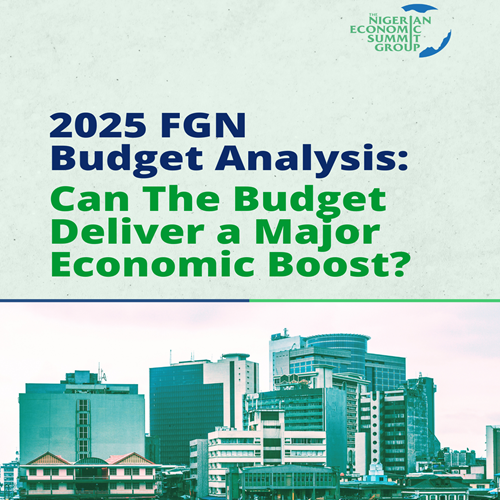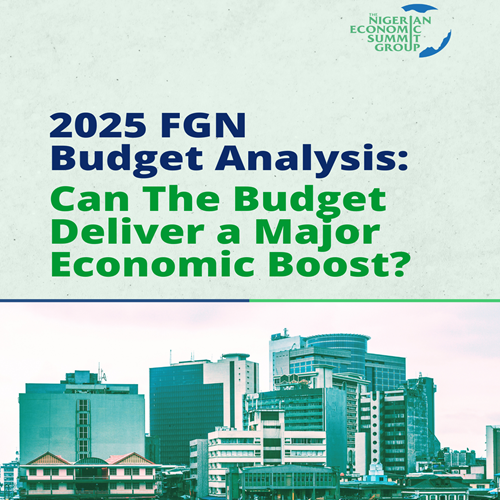Posted Sat, Oct 16, 2021 1:40 PM
Bridging the Housing and Urban Development divide

The Infrastructure Policy Commission of the Nigerian Economic Summit Group (NESG) on Tuesday, 5th of October, 2021, held a pre 27th Nigerian Economic Summit (#NES27) event with the theme “Bridging the Housing and Urban Development Divide.”
In her welcome remarks, NESG Board member and executive director Kainos Edge, Mrs Wonu Adetayo, stated that the rising rate of rural-urban migration has tremendously increased over the years as a result of disempowerment of subnationals, chronic insecurity and the impact of climate change which puts a significant strain on urban development and negatively impacts the environment. She stated that it was essential for all stakeholders to give urgent and strategic attention to reforming urban settlements as a means of curbing and managing urban migration.
Mrs Adetayo also revealed that 69 per cent of urban populations in Nigeria live in slums, and failing to act decisively will increase slum-like conditions, which will further exacerbate insecurity and poor quality of life. “This is why bridging the housing divide will help focus on addressing issues that will facilitate Nigerians to own and build decent housing at affordable cost and making secure tenors available. It is our expectation that by the end of the deliberations, we will come up with implementable strategies to bridge the gap and meet present and future urbanisation needs of Nigeria,” she stated.
Founder/CEO Eximia Realty Company Limited and Chairman of the Lagos Building Investment Company Plc, Mr Hakeem Ogunniran, in his remarks, said that housing is one of the underserved sectors and that the national urban policy identifies the need to promote a system of well managed urban settlement that encourages collaborative platforms which engages several players including regulators, developers, private sector players and all other relevant stakeholders to solve Nigeria’s housing challenge.
Furthermore, Mr Adeniran stated that for mortgages to be made available, there is a need for assets to be created and that some of the problems facing the sectors include access to good titled land, security of tenor, getting approvals from multiple regulatory agencies and Inadequacy of infrastructure which all contribute to increasing the cost of housing. He reiterated the need to commoditise housing by streamlining approval processes, improving Industrialising processes and deploying appropriate measures in housing development through a public-private partnership model that will help create reasonable and affordable housing.
During the panel session, Ms Imeh Okon, Senior Special Assistant to the President on Infrastructure, said that some states, including Lagos and Ogun states, have been providing affordable housing for residents. The federal government is collaborating with states through the Family homes programmes and National Housing programmes to help bridge the housing gap that exists in Nigeria. She noted a need to improve and support enhancement capacities of states, professional bodies and regulators to help increase their ability to deliver excellent and affordable housing to Nigerians.
A housing and urban development specialist, Mr Claudio Aciorly, said that urban development is all-encompassing and includes infrastructure, finance, labour, building, legal and regulatory frameworks. He noted that appropriate action and policies from all stakeholders would ensure affordable and adequate housing is provided to all Nigerians. There is a need for all stakeholders to be committed to providing opportunities for citizens to access housing with basic infrastructure in a location that allows access to jobs and opportunities.
Mr Aciorly also stated the importance of ensuring that all infrastructural policies focus on demand and the ability to increase the capacity of the citizenry to afford housing. “The cost of land, infrastructure, finance, tax and several other elements should be incorporated in government interventions. Alternatives should be provided to avoid people going to informal land developers and ensuring urban policies align with realities,” he stated.
Prof. Ademola Omojola, professor of Geography, University of Lagos, said that a lot of cities don’t have proper cadastral and property layouts, and the recent focus on urban development presents an excellent opportunity for subnational, especially the local governments, to enumerate the number of properties that falls within their jurisdictions.
Dr Chii Akporji, director of Shelter Afrique, said income constraints as most Nigerians fall under the income bracket, but streamlining underwriting standards and longer tenor mortgages has helped improve access to housing. Still, access to mortgage finance remains limited to a lot of Nigerians. She encouraged professional developers to be on the lookout for alternative sources of funding which are sometimes linked to the adoption of alternative building methods such as green finance and bonds.
In his closing remarks, NESG board member and Facilitator, Infrastructure Policy Commission Mr Nnanna Ude said that while there are clear opportunities, the country also faces some challenges in attaining goal 7 of the Sustainable Development Goals (SDGs). He called on the government and all stakeholders to prioritise housing and urban development in Nigeria for the benefit of the citizenry.
Find a blog post
Latest Releases

2025 FGN Budget Analysis: Can Th .. Read
1 day ago

2025 FGN Budget Analysis: Can Th .. Read
1 day ago

Industrial Policy Commission Gen .. Read
2 weeks from now
